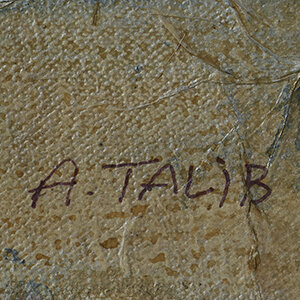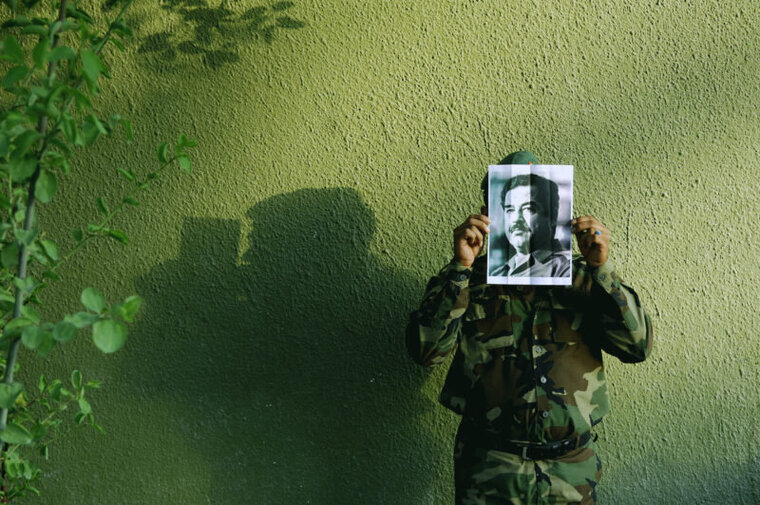


Last updated on Sun 3 November, 2019


MOMA PS1 PRESENTS MAJOR GROUP EXHIBITION EXPLORING THE ARTISTIC LEGACY OF AMERICAN MILITARY ENGAGEMENT IN IRAQ
Theater of Operations: The Gulf Wars 1991–2011
November 3, 2019 – March 1, 2020
MoMA PS1
LONG ISLAND CITY, New York, October 30, 2019—MoMA PS1 presents a large-scale group exhibition examining the legacies of American-led military engagement in Iraq beginning with the Gulf War in 1991. Through more than 250 works, Theater of Operations: The Gulf Wars 1991-2011 explores the effects of these wars on artists based in Iraq and its diasporas, as well as those responding to the war from the West. Featuring the work of over 80 artists and collectives, Theater of Operations will be on view across the entire MoMA PS1 building from November 3, 2019 through March 1, 2020.
American-led military engagement in Iraq over the last 30 years has had an indelible impact on contemporary culture and the work of artists around the world. While brief, the 1991 Gulf War marked the start of a prolonged conflict with Iraq that led to more than a decade of sanctions and the 2003 Iraq War. These wars and their aftermaths have had devastating impacts on Iraq and its people, contributing to the destabilization of the broader Middle East. Conflict with Iraq has also become an enduring part of American life, influencing culture, politics, and identity.
The artists in Theater of Operations were also impacted by significant cultural change during this period—including the advent of the 24-hour news cycle, the Internet, and new media and military technologies. The wide range of perspectives included in this exhibition also attests to the rich artistic traditions of contemporary Iraq, with artists working under conditions of war, embargo, and occupation placed in conversation with those responding to these wars from afar.
Theater of Operations includes work by 82 artists and collectives: Sherko Abbas, Ghaith Abdulahad, Afifa Aleiby, Sadik Kwaish Alfraji, Himat M. Ali, Francis Alÿs, Jananne Al-Ani, Rasheed Araeen, Cory Arcangel, Layla Al-Attar, Michel Auder, Dia al-Azzawi, Thuraya AlBaqsami, Wafaa Bilal, Dara Birnbaum, Fernando Botero, Roger Brown, Paul Chan, Sue Coe, Tony Cokes, Susan Crile, Verne Dawson, Deep Dish TV, Melvin Edwards, Ali Eyal, Alia Farid, Harun Farocki, Ismail Fattah, Karen Finley, Rainer Ganahl, Ghassan Ghaib, Tarek AlGhoussein, Felix Gonzalez-Torres, Guerrilla Girls, Richard Hamilton, Mona Hatoum, Wally Hedrick, Thomas Hirschhorn, Jenny Holzer, Hiwa K, Mary Kelly, Jon Kessler, Rachel Khedoori, Louise Lawler, An-My Lê, Hanaa Malallah, Susan Meiselas, Robert Morris, JeanLuc Moulène, Mohammed Muhraddin, Steve Mumford, Rafa Nasiri, Mahmoud Obaidi, Jamal Penjweny, Monira Al Qadiri, Khalifa Qattan, Nuha al-Radi, Michael Rakowitz, Oday Rasheed, Ali Rashid, Miguel Angel Ríos, Kareem Risan, Sophie Ristelhueber, Martha Rosler, Judith Joy Ross, Shakir Hassan, Samir, Allan Sekula, Richard Serra, Delair Shaker, Mohammed Al Shammarey, Urok Shirhan, Sean Snyder, Deborah Stratman, Sturtevant, Elia Suleiman, Ali Talib, Jalal Toufic, Luc Tuymans, Nazar Yahya, Ali Yass, and Ala Younis.
Theater of Operations: The Gulf Wars 1991–2011 is organized by Peter Eleey, Chief Curator, and Ruba Katrib, Curator, MoMA PS1; with Jocelyn Miller, Assistant Curator; Josephine Graf, Curatorial Assistant; and Oliver Shultz, former Curatorial Associate.
PUBLIC PROGRAMS
Opening Events
Sunday, Nov 3, 12–6 p.m.
A screening of Werner Herzog’s documentary film Lessons of Darkness (1992) is followed by conversations with catalog contributors Rijin Sahakian, Nada Shabout, and McKenzie Wark, as well as exhibition curators Peter Eleey and Ruba Katrib.
Film Series
Select Weekends: Nov 3, Nov 16, Nov 24, Dec 8, Jan 12, Jan 25, Jan 26, Feb 9, Feb 22, Feb
23, Mar 1
Over the course of the exhibition, more than 20 films that span both mainstream and independent filmmaking throughout the Gulf War (1991) and the Iraq War (2003-2011) are screened in the cinema. The series features films that are rarely shown in the US, many of which were directed and produced by Iraqis, as well as award-winning Hollywood movies.
These films complicate mainstream news media narratives around the wars, offering key insights and perspectives while at times presenting misleading or dated depictions. Also included are documentaries that depict the situations American troops faced on the ground as well as those focused on the realities of daily life for Iraqis. See the full schedule at mo.ma/films.
Curator-Led Tours
Sundays, Dec 15 and Feb 9, 3 p.m.
Exhibition curators Peter Eleey and Ruba Katrib lead public tours focused on a specific aspect of the show, highlighting selected artists and works to give visitors a more in-depth understanding of the themes and ideas addressed in the exhibition.
The Politics of Preservation
Sunday, Jan 12, 3 p.m.
Writer and poet Sinan Antoon will participate in a conversation about the destruction of Iraqi heritage by the allied forces during the Gulf wars, expanding beyond antiquities to address the living contemporary culture of Iraq. Renowned Iraqi maqam vocalist Hamid AlSaadi performs with the celebrated ensemble Safaafir featuring Amir ElSaffar.
Closing Events
Sunday, Mar 1, 3 p.m.
VW Sunday Sessions presents an afternoon of film, performance, presentations, and music, beginning with a second screening of Werner Herzog’s documentary, Lessons of Darkness (1992). Following the film, New York-based artists featured in the exhibition will respond to and expand upon their work with performances, readings, and presentations.
PUBLICATION
In conjunction with Theater of Operations, MoMA PS1 has published a catalog with contributions by Zainab Bahrani, Rijin Sahakian, Nada Shabout, McKenzie Wark, and the exhibition curators, addressing art historical and political subjects relating to the exhibition.
SPONSORSHIP
Major support for Theater of Operations: The Gulf Wars 1991–2011 is provided by The Andy Warhol Foundation for the Visual Arts. Generous funding is provided by The International Council of The Museum of Modern Art, an anonymous donor, Dana Farouki, Tony and Elham Salamé, Barjeel Art Foundation, Darat al Funun-The Khalid Shoman Foundation, and Rana Sadik and Samer Younis. Additional support is provided by the MoMA PS1 Annual Exhibition Fund.
ABOUT MoMA PS1
MoMA PS1 is devoted to today’s most experimental, thought-provoking contemporary art.
Founded in 1976 as the P.S.1 Contemporary Art Center, it was the first nonprofit arts center in the United States devoted solely to contemporary art and is recognized as a defining force in the alternative space movement. In 2000 The Museum of Modern Art and P.S.1 Contemporary Art Center merged, creating the largest platform for contemporary art in the country and one of the largest in the world. Functioning as a living, active meeting place for the general public, MoMA PS1 is a catalyst for ideas, discourses, and new trends in contemporary art.
Hours: MoMA PS1 is open from 12:00 p.m. to 6:00 p.m., Thursday through Monday.
Closed on Thanksgiving, Christmas, and New Year’s Day.
Admission: $10 suggested donation; $5 for students and senior citizens; free for New York City residents, MoMA members, and MoMA admission ticket holders within 14 days of visit. Free admission as a Gift to New Yorkers made possible by the Anna-Maria and Stephen Kellen Foundation.
Directions: MoMA PS1 is located at 22-25 Jackson Avenue at 46th Ave in Long Island City, Queens, across the Queensboro Bridge from midtown Manhattan. Traveling by subway, take the E, M, or 7 to Court Sq; or the G to Court Sq or 21 St-Van Alst. By bus, take the Q67 to Jackson and 46th Ave or the B62 to 46th Ave.
Information: For general inquiries, call (718) 784-2084 or visit momaps1.org.
Press Contact: Molly Kurzius, (718) 392-6447 or [email protected]
General Press Inquiries: [email protected]
For downloadable high-resolution images, visit moma.org/press.
Join us in our endless discovery of modern and contemporary Arab art